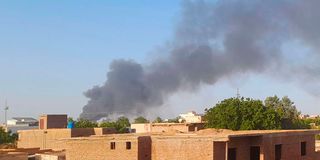UN Rights Council votes to establish atrocities probe team in Sudan

Smoke billows in the distance around the Khartoum Bahri district amid ongoing fighting on July 14, 2023.
The UN Human Rights Council voted on Wednesday to set up a controversial fact-finding mission into alleged atrocities in Sudan, opening a new door in Khartoum's diplomatic battle to save its image.
The decision came after a narrow vote in which the Council adopted a resolution despite the refusal of the entire African membership of the Council to support it.
It was passed by 19 votes in favour, 16 against and 12 abstentions, allowing the Council to establish a Fact-Finding Mission (FFM) to Sudan.
Draft Resolution A/HRC/54/L.18 was intended to help the UN respond to the human rights and humanitarian crisis caused by the ongoing armed conflict in Sudan.
Proposed by the UK, the US and Norway, it suggested to investigate abuses committed during the six-month war, which pitted the Sudan Armed Forces against the Rapid Support Forces.
A number of rights groups, as well as the UN High Commissioner for Human Rights, Volker Türk, had warned that war crimes and other crimes against humanity had been committed in Sudan by both sides, including rape, starvation, mass killings and forced displacement.
But Sudan rejected the FFM from the outset, arguing that the Sudan armed forces were a legitimate authority capable of punishing wrongdoers. Sudan, a member of the Council, rallied its allies to either reject the proposal or abstain.
Eritrea, Senegal, Somalia, Sudan, Ivory Coast, Morocco and Algeria joined Sudan in voting no, while South Africa, Gambia, Malawi, Cameroon and Benin abstained. Khartoum was also backed by Middle Eastern countries Qatar and the United Arab Emirates, which rejected the resolution.
The team may be announced later, but it could still face hostility from within Sudan and its neighbourhood, which rejected it. Nevertheless, the team is expected to investigate atrocities and name perpetrators for possible prosecution at the International Criminal Court, should the UN Security Council refer them there.
The matter was put to a vote after members failed to reach a consensus.
Last week, 17 rights groups from across Africa wrote to the UN Human Rights Council calling for such a team to be set up to put warlords on the spot and save the country from collapse.
“We urge the (UN Human Rights) Council members to support the establishment of this mission to increase Sudanese people’s access to justice and accountability and enhance the chances of creating a transitional justice process that will support the efforts of peace-making in Sudan,” they wrote in an open letter on Wednesday last week.
They include Sudanese Doctors for Human Rights, Governance Programming Overseas, Sudanese Women Rights Action, International Bar Association's Human Rights Institute, African Center for Democracy and Human Rights Studies, International Federation for Human Rights, Southern African Human Rights Defenders Network (Southern Defenders), Centre for Democracy and Human Rights - CDD Mozambique and Cairo Institute for Human Rights Studies.





